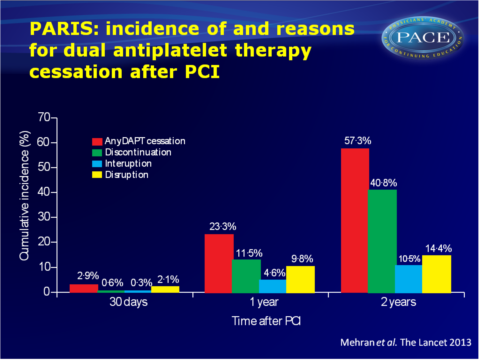PARIS: stable patients can safely discontinue dual antiplatelet therapy after PCI
16/09/2013
Continuing treatment with DAPT does not yield trombotic risk reduction as compared to discontinuing treatment on doctor’s advice. Low compliance does increase MACE risk.
PARIS: Incidence and Impact of Dual Antiplatelet Therapy Cessation On Adverse Cardiac Events Following Percutaneous Coronary Intervention: Two-Year Results from the Patterns of Non-Adherence to Anti-Platelet Regimens In Stented Patients (PARIS) StudyNews - Sep. 16, 2013
Presented at the ESC congress by: Roxana MEHRAN (New York, US)
Short interruption of medication did not affect the risk of trombotic events.
Download PARIS 2013 PACE.pptxor click to enlarge.

Background
This observational study aimed to determine when and why patients discontinue antiplatelet treatment (on doctor’s advice), when they stop temporarily due to a surgical intervention, or when they disrupt treatment as a result of bleeding complications or lack of compliance, when dual antiplatelet therapy (DAPT) is prescribed after stentimplantation. The possible relationship between specific patterns of lack of compliance and patient outcomes was also investigated.Main results
- After 2 years, a cumulative incidence was seen of 40.8% for discontinuation of treatment, 10.5% of temporary interruption and 14.4% of disruption of the treatment. After 1 year, the currently recommended treatment duration, the cumulative incidences were 11.5%, 4.6% and 9.8% respectively.
- Cumulative incidence of major cardiovascular events (MACE) was 7.4% after 1 year and 11.5% after 2 year.
- Most of MACE occurred in patients who continued using MACE.
Short interruption of medication did not affect the risk of trombotic events.
Conclusion
Continuing treatment with DAPT does not yield a lower risk of thrombosis as compared to discontinuation of the treatment on doctor’s advice. These results show that it is safe to stop DAPT treatment in stable patients who have undergone PCI. In the clinical setting, physicians appear to take the right decisions as to which patients with a low risk can discontinue antiplatelet medication. However, when patients are not compliant, or when they are forced to stop antiplatelet medication, they will have an increased risk.Download PARIS 2013 PACE.pptxor click to enlarge.

